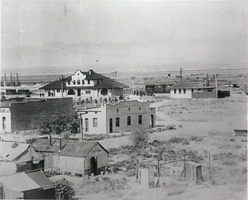Search the Special Collections and Archives Portal
Search Results

Photograph of the Union Pacific Depot, 1906
Date
Archival Collection
Description
Image
F. Lorin Ronnow oral history interview
Identifier
Abstract
Oral history interview with F. Lorin Ronnow conducted by Mindy Braver on March 11, 1981 for the Ralph Roske Oral History Project on Early Las Vegas. In this interview, Ronnow discusses his personal history in Las Vegas, Nevada after being hired by the Union Pacific Railroad to play for their baseball team in 1928. Ronnow discusses being a hoisting engineer during the construction of the Hoover Dam, the economic benefit of the dam during the Great Depression, and his own business ventures in Las Vegas. Ronnow describes his career in banking, how Las Vegas has changed, and prominent celebrities coming to Nevada to divorce. Ronnow also discusses occupational discrimination against African Americans and women.
Archival Collection
John J. Weeteling oral history interview
Identifier
Abstract
Oral history interview with John J. Weeteling conducted by his son, Terry Weeteling, on April 07, 1976 for the Ralph Roske Oral History Project on Early Las Vegas. In this interview, Weeteling describes moving to Tonopah, Nevada in 1942 while enlisted in the United States Air Force and life in the town. He talks about moving to Ely, Nevada in 1945 and working there as a truck driver, how Ely has grown and changed, and opening a paint and body shop in Hawthorne, Nevada. Weeteling continues, explaining why he moved to Henderson, Nevada in 1947, joining the fire department on the Basic Magnesium Plant compound, and describes life in Henderson. He then describes moving to Las Vegas, Nevada in 1951, Fremont Street during the 1950s, and the development of the Las Vegas Strip. Weeteling concludes by discussing local politicians, his recreational activities, ghost towns in Nevada, and nuclear weapons testing.
Archival Collection
Gue Gim Wah oral history interviews
Identifier
Abstract
Oral history interviews with Gue Gim Wah conducted by Elizabeth N. Patrick on September 23, 1981 and September 24, 1981 for the Ralph Roske Oral History Project on Early Las Vegas. In this interview, Wah discusses her life as a Chinese immigrant, her husband's life, and running the dining operations at the Prince Mine near Pioche, Nevada. Wah describes arriving in the United States as a child and the difficult immigration process she faced. She discusses her marriage to her husband, Tom Wah, and his life working for the railroads and as a miner before running a boarding house and restaurant for those working in the Prince Mine. Wah later talks about her experiences running the boarding house after the death of her husband in the early 1930s. Throughout the interview, Wah describes different aspects of Chinese culture and what life was like living in a Nevada mining town during the early twentieth century.
Archival Collection
Charlotte Ellsworth oral history interview
Identifier
Abstract
Oral history interview with Charlotte Ellsworth conducted by Jane Ellsworth Olive on March 22, 1977, December 26, 1980, December 28, 1981, and August 06, 1987 for the Ralph Roske Oral History Project on Early Las Vegas. In the span of four interviews, Ellsworth discusses her family’s history, the growth of Henderson, Nevada, working at the Basic Magnesium Plant, and life during World War II. She also talks about war bond drives, the Oakey Theaters, Nevada Chamber of Commerce, "western" clothes, and hotels like the Flamingo Hotel and the Riviera Hotel. She then describes visiting places like Canada, Salt Lake City, Utah, Washington, D. C., and San Francisco, California.
Archival Collection
Nanyu Tomiyasu oral history interview
Identifier
Abstract
Oral history interview with Nanyu Tomiyasu conducted by Mark French on April 12, 1977 for the Ralph Roske Oral History Project on Early Las Vegas. Tomiyasu begins by discussing his father's immigration from Japan to North America in 1898, and his move to Las Vegas, Nevada in 1916. He talks about his father's work in agriculture and the types of crops grown in Las Vegas during the early twentieth century. Tomiyasu also discusses his own upbringing in Las Vegas, how the city has changed and grown, and his education. Tomiyasu describes the Native Americans of Southern Nevada, the environmental changes caused by the construction of the Hoover Dam (Boulder Dam), and his experiences as a Japanese American in Las Vegas.
Archival Collection
Elaine and Jim McCormick oral history interview
Identifier
Abstract
Oral history interview with Elaine and Jim McCormick conducted by Nancy Weber on March 11, 1981 for the Ralph Roske Oral History Project on Early Las Vegas. Elaine McCormick's son, Jim McCormick, was present to clarify information for his mother in the first half, then was the interview subject in the second half. Elaine McCormick discusses life as a homemaker, housewife, and owner of the Green Shack Restaurant after moving to Las Vegas, Nevada from California in 1935. Jim McCormick discusses his early life navigating Las Vegas roads, local entertainers, the weather, and Las Vegas population growth.
Archival Collection

Jack Howard interview, February 27, 1977: transcript
Date
Archival Collection
Description
From the Ralph Roske Oral History Project on Early Las Vegas collection OH-00897. On February 27, 1977, collector Michael K. Ericksen interviewed his uncle, schoolteacher, Jack E. Howard, (born June 18th, 1920 in Dewey, Oklahoma) in his home in Overton, Nevada. This interview covers Mr. Howard’s personal experiences and recollections about Southern Nevada. Mr. Howard’s wife, Mrs. Helen Howard, is also present during this interview, which offers a thirty year local overview.
Text
Robert Alton Thielke oral history interview
Identifier
Abstract
Oral history interviews with Robert Alton Thielke conducted by his grandson, Harry Stephen Lauer, on March 12, 1975 and an unknown date in 1975 for the Ralph Roske Oral History Project on Early Las Vegas. In these interviews, Thielke discusses his personal history working for railroads, gas companies, and munitions manufacturers before moving to Las Vegas, Nevada in 1948. Thielke describes life in Las Vegas during the 1940s and taking road trips in a Ford Model T roadster. He talks about how Las Vegas has changed and grown, as well as rodeos in the city. Thielke explains the history of Henderson, Nevada, manganese mining, and the history of Stewart Ranch. He also describes his recreational activities and explains that he moved out of west Las Vegas because of the increase of African Americans living in that area.
Archival Collection
Rossi Ralenkotter oral history interview
Identifier
Abstract
Oral history interview with Rossi Ralenkotter conducted by Claytee D. White on August 4, 2022 for the Boyer Early Las Vegas Oral History Project. In this interview, Ralenkotter describes migrating to Las Vegas, Nevada in 1951 with his parents at the age of four. He shares early memories of the city, and talks about how it brought him to be president and CEO of the Las Vegas Convention and Visitors Authority (LVCVA). Ralenkotter is responsible for marketing and branding Las Vegas and Southern Nevada as the world's most desirable destination for leisure and business travel. Under his leadership, the LVCVA launched the most successful branding campaign in tourism history, "What Happens in Vegas, Stays in Vegas." In 1971, Ralenkotter earned a master's degree in Business Administration from the University of Nevada, Las Vegas (UNLV) and in 2008 was selected as Alumni of the Year. In 2009, he was honored with UNLV's Distinguished Nevadan Award. Throughout the interview, Ralenkotter recalls his many memories of the city throughout his life, including cruising Fremont Street, swimming at Lorenzi Park, participating in Helldorado parades, and watching the transformation of sports in the city.
Archival Collection
